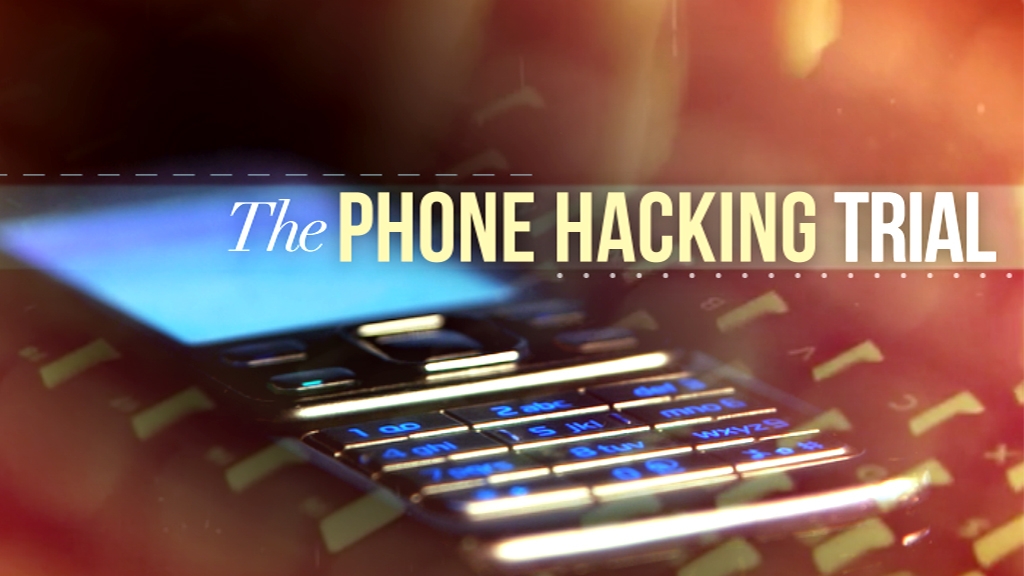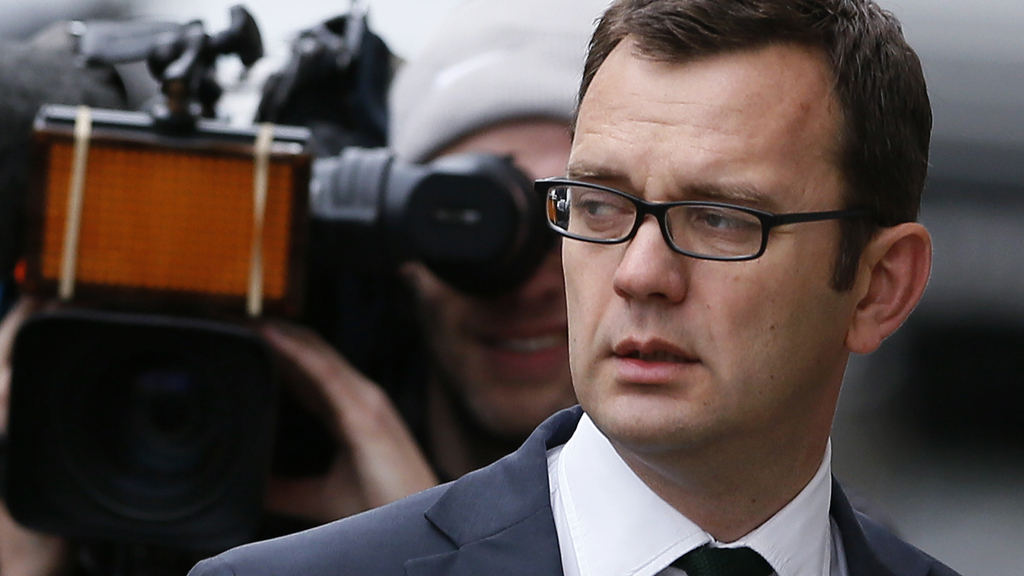Love letters, celebrity phones: phone-hacking trial week 1
Jury sworn in, four defendants plead guilty to phone-hacking and a love letter from Rebekah Brooks to Andy Coulson read out in court: Channel 4 News has the weekly phone-hacking trial round-up.

Monday 28 October 2013
Some 16 months after the CPS announced charges against Rebekah Brooks, Andy Coulson and others, the so-called phone hacking trial kicked off in earnest.
100 people packed into court 12 at the Old Bailey, with all eight defendants in the dock. So high was the level of interest in today’s proceedings that a separate room was required for journalists to watch.
80 potential jurors were called before Mr Justice Saunders. They were warned that, if selected, they faced up to five or six months of “significant disruption” to their lives. Their prospective task, said the judge, is to try “an important case”.
That number was whittled down to 33 possible jurors, once those with pre-booked holidays, so-called “critical” jobs and childcare commitments were ruled out. From these men and women, a final panel will be selected and sworn in tomorrow.
The eight defendants were released on bail and will return tomorrow morning.
Tuesday 29 October 2013
The defendants returned to court for the selection of a jury. Nine women and three men were sworn in as jurors – their lives on hold for the next five months, as they consider the case. An indictment containing the seven counts was read out in court.
But it was events outside the courtroom which dominated the hearing. Private Eye published a provocative front cover likening Rebekah Brooks to a witch. The judge, Mr Justice Saunders, called it “a joke in especially bad taste”. The attorney general eventually ruled that this was not in contempt of court.
In the wake of this pre-trial publicity, Mr Justice Saunders read out a lengthy direction for the jury. There had been, he said, “perhaps an unprecedented amount” of pre-trial publicity, including a significant amount of material that was “inaccurate”, “abusive” and “offensive and demeaning to some of the defendants”.
“In this case,” he said, “the defendants are not just on trial, but British justice is on trial.”
Wednesday 30 October 2013
The jurors returned to court for the beginning of the prosecution’s case. At 2pm, Andrew Edis QC began laying out the case for the crown.
He revealed that three defendants, the former News of the World news desk editors Greg Miskiw, Neville Thurlbeck and James Weatherup, had already entered guilty pleas to charges of conspiracy to intercept communications – that’s phone hacking – at earlier hearings.
The court was also told that private investigator Glenn Mulcaire had pleaded guilty to hacking the phone of murdered schoolgirl Milly Dowler.
They learned details of some of the corrupt payments alleged to have occurred at the Sun under Ms Brooks’s editorship. One MoD official, Bettina Jordan-Barber, the court was told, was paid £40,000 for stories by the newspaper. Ms Jordan-Barber’s actions are all the more significant because, it emerged, she was a “particularly trusted” MoD employee, with developed vetting – that’s one of the highest levels of security clearance in the ministry.
The court also heard about a list of victims that included the politicians Tessa Jowell, Lord Prescott and David Blunkett; the actors Jude Law and Sienna Miller; the financier Lord Frederick Windsor; as well as Sir Paul McCartney and his ex-wife Heather Mills. In addition, they heard about the less famous victims – an unnamed friend of Joanna Lumley, a friend of Kate Moss’s brother, and an associate of David Blunkett.
And they learned of what they were told was a “cover-up” mounted by Ms Brooks, her husband and her PA Cheryl Carter in the days before the closure of the News of the World.

Thursday 31 October 2013
Today prosecution lawyer Andrew Edis QC detailed some of the hacking carried out by Glenn Mulcaire.
Much of Mr Edis’s speech focused on evidence from the notebooks of Glenn Mulcaire, described as “a ‘phone hacker and a good one… he was also an accomplished blagger”. The court was played a recording of Mr Mulcaire blagging a pin number in order to hack a phone. He appears at ease, chatting easily with the operator and giving them a network password: “Albatross”.
Other evidence was read out suggesting that defendant Ian Edmondson had repeatedly “tasked” Mr Mulcaire to hack phones and, Mr Edis claimed, hacked them himself.
An intensely personal letter from Rebekah Brooks to Andy Coulson (above) was read out in court. It revealed a passionate love affair between the two that had occurred, Mr Edis said, for at least six years, while both were married to other people. It was a relationship so significant that, when Mr Coulson sought to end it, Ms Brooks wrote “without our relationship in my life, I am really not sure how I will cope.” The rationale behind exposing this affair to public scrutiny? To allow the jury to assess whether these two alleged conspirators could have trusted each other with a criminal secret.
The court was also played a recording made by David Blunkett, when Mr Coulson confronted the cabinet minister about his relationship with a married woman. Mr Coulson said he was sure the story was true but that he could not reveal his source – because, said the prosecution, it was from a hacked voicemail message. And jurors heard Mr Coulson explaining why he felt it right to expose a cabinet minister for sleeping with a married woman.
Then came the detail about the case that finished off the News of the World: the hacking of murdered schoolgirl Milly Dowler. The court heard that Stuart Kuttner, managing editor of the News of the World, presented Surrey Police with written evidence that the paper had hacked telephones all the way back in 2002, but that the police force did nothing to investigate.
Correspondence appeared to show that Mr Kuttner had also pursued the police with requests that they allow the News of the World to assist their enquiry. This evidence would though, be overshadowed by the revelation of an affair between two figures at the centre of tabloid journalism.
Friday 1 November 2013
Andrew Edis QC had ended his Thursday evidence with the promise that, after revelations about the hacking of figures close to Mr Blunkett, the jury would hear evidence about the hacking of people close to another home secretary. And so it was that the jury heard about the hacking of Charles Clarke and his former special adviser, Hannah Pawlby.
News of the World journalists received a tip that Ms Pawlby was having an affair with Mr Clarke. It transpired, from an email read out in court, that the tip came from “a Westminster insider who fancied Pawlby, was going to ask her out and was told, ‘Don’t bother wasting your time – she’s with Charles.'” “This was not true,” said Mr Edis QC.
The News of the World mounted an extensive investigation, that the prosecution said included: placing journalists outside her home to watch her; Mr Coulson telephoning her twice in an attempt to extract an admission; and crucially, listening to answerphone messages on her phone and those of her friends and family. “A perfectly rational but entirely illegal system,” designed to stand the story up, according to Mr Edis.
Then came emails, which, the prosecution say, show Andy Coulson had known all about phone hacking on the paper. The jury was shown an alleged email exchange between Ian Edmondson and Andy Coulson. It concerned an exclusive about Calum Best, son of footballer George Best. Mr Edmondson was concerned that Mr Best would attempt to spoil the exclusive story. Mr Coulson gave a simple reply: “Do his ‘phone.”
Mr Edis’s opening statement ranged widely, covering a range of alleged offences. But there was one theme at the centre of most of the allegations: a demand for stories about the royal family.
The court saw a transcript of a voicemail left by Prince Harry on the answerphone of his private secretary. The voicemail on its own was enough to give the News of the World a scoop. And NoW Royal Editor Clive Goodman was determined to get more. To facilitate phone hacking, say the prosecution, Mr Goodman obtained internal palace phone directories, paying an unkown policeman.
Emails shown to the court showed, according to Mr Edis, that Mr Coulson signed off one payment for £1,000 for a “rare and just printed palace staff phone book”. This despite Mr Goodman explaining that, for his source, the directory was “a very risky document to nick”. Another email from Mr Goodman, copied to Managing Editor Stuart Kuttner, appear to state that were three of his sources to be unmasked, it would “put them, me, you and the editor in jail”.
And the prosecution say that the Sun, under the editorship of Ms Brooks, shared the NoW’s appetite for royal stories. The jury saw a number of emails in which Mrs Brooks, accused of conspiring to commit misconduct in public office, allegedly responded to requests to pay sources. The prosecution say she authorised payments totalling tens of thousands of pounds to military sources.
Ms Brooks was accused of agreeing a fee of £4,000 to a serving Sandhurst official for an embarrassing photo of Prince William in a bikini, and to okaying repeated payments to a journalist’s “number one military contact”. The payments were not just for royal stories, but for military information. According to Mr Edis, the Sun even paid for early information about dead British soldiers.
The trial resumes on Monday.